|
|
|
Sort Order |
|
|
|
Items / Page
|
|
|
|
|
|
|
| Srl | Item |
| 1 |
ID:
128862
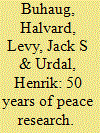

|
|
|
|
|
| Publication |
2014.
|
| Summary/Abstract |
Established in 1964, the Journal of Peace Research (JPR) celebrates 50 years. This anniversary special issue of the journal offers broad reviews of research areas that have been central both to the journal and to the field of peace and conflict research generally. An opening article co-authored by long-time editor Nils Petter Gleditsch offers a historical view on peace research and tracks trends in the use of 'peace' and 'violence' in titles of JPR across the first 49 volumes of the journal. Opening the review article section, two contributions address key thematic areas for the journal. Few if any subjects have attracted more attention in the study of international relations during the second half of JPR's first 50 years than the democratic peace, and in the extension of this subject, the broader debate about the liberal peace. Additional articles review the status and propose future developments in the study of war and its relationship with territory, ethnicity, ideology and natural resources. Another key historical topic associated with the journal concerns the economic cost of military conflict, while more recent research fields covered include terrorism and human rights, topics that have grown to become major JPR niches. Reflecting the methodological contributions by JPR, two articles focus on challenges of contemporary quantitative political analysis and progress in peace and conflict data collection. Finally, this special issue includes a review of research on international mediation in armed conflicts.
|
|
|
|
|
|
|
|
|
|
|
|
|
|
|
|
| 2 |
ID:
092881
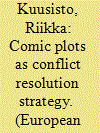

|
|
|
|
|
| Publication |
2009.
|
| Summary/Abstract |
Recently, the 'war stories' of the leaders of the major Western powers - the United States, Britain and France - have adhered to two major plots: the heroic epic or the sad tragedy. The heroic script defines and explains conflicts in which the Western powers have wished to play an active role: the Persian Gulf (1990-1), Kosovo (1999) and the current war against terrorism. The tragic plot has been employed when they have ruled out forceful outside intervention, like in Bosnia (1992-5) and Rwanda (1994). Both scripts are highly problematic conflict resolution approaches: they point to black-and-white, aggressive denouements. An alternative is the comic plot: a story traditionally used in ordinary disagreements among friends, problems with 'small foes' and disputes with important rivals. Adopting a comic framework for most of the conflicts in the world would give the Western leaders more room to negotiate, to try out new ideas and to back down on unsuccessful strategies.
|
|
|
|
|
|
|
|
|
|
|
|
|
|
|
|
| 3 |
ID:
184138
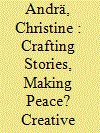

|
|
|
|
|
| Summary/Abstract |
This article examines the analytical and political potentials of creative methods for peace research. Specifically, the article argues that creative methods can textile, i.e. render material and irregularly textured, (research on) post-conflict politics. Grounded in a collaborative research project with former combatants in Colombia, the article takes this project’s methods – narrative practice, textile-making, and a travelling exhibition – as examples to demonstrate how creative methods’ element of making contributes to the development of post-conflict subjectivities and relationships. Casting the data generated by creative methods as crafted stories, the article also shows how in these stories, semantic meaning becomes entangled with material traces of emotional, affective, and embodied experiences of violence and its aftermath, effecting a shift in the post-conflict distribution of the sensible. By exploring creative methods’ capacity for textiling peace (research), the article contributes to research on creativity, the arts, and peace and on the post-conflict trajectories of former combatants.
|
|
|
|
|
|
|
|
|
|
|
|
|
|
|
|
| 4 |
ID:
159968
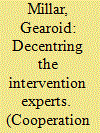

|
|
|
|
|
| Summary/Abstract |
The failures of peace interventions are often associated with their exogenously conceived and technocratic nature, which discount complexity within and diversity between post-conflict contexts. In response, scholars have resorted to concepts of empowerment, resistance, hybridity and friction to refocus post-conflict policymaking away from ‘top-down’ and towards ‘bottom-up’ processes. Any such efforts, however, require that policymakers understand the local drivers and everyday experiences of peace interventions across a range of cases, a task for which the current tools of the intervention experts have proven unsuited. This article, therefore, proposes an Ethnographic Peace Research (EPR) agenda that would provide access for and influence to the ‘peace kept’ and decentre the intervention experts in peacebuilding policy. In its effort to influence policy, however, an EPR agenda faces substantial challenges. These include, among others, the failure of academics to communicate clearly to non-academic audiences, the ideological biases of policymakers and the relentless simplification of complexity. However, as will be discussed and evidenced using a variety of cases below, an EPR approach also has a number of strengths that can enhance its relevance for policy, serve to decentre the intervention experts and develop a credible alternative bottom-up approach to policymaking in post-conflict states.
|
|
|
|
|
|
|
|
|
|
|
|
|
|
|
|
| 5 |
ID:
159416
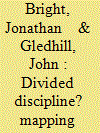

|
|
|
|
|
| Summary/Abstract |
Scholars in the field of peace and conflict studies have long worried that their discipline is divided – between studies of war and war making, and studies of peace and peacemaking. However, empirical research into the existence, extent, and nature of such a division is scarce. We remedy this by addressing two questions: 1) how is work in the field of peace and conflict studies distributed between its two nominal pillars: “peace” and (violent) “conflict”? and 2) to what extent is there communication and exchange between the two sets of studies? Making use of a unique combination of methods, we find that studies of violence hold a dominant position in the field, although there is also a sizable body of work that explores topics of peace, understood as conflict prevention and/or response. That said, we find limited evidence of intellectual exchange between studies of war/making and peace/making. We also find evidence of gendered, regional, and methodological divides. We argue that such schisms may be preventing scholars of peace and conflict from collectively realizing the founding ontological goal of their discipline, which was to understand the causes of war in order to contribute to an understanding of how conflict can be managed peacefully.
|
|
|
|
|
|
|
|
|
|
|
|
|
|
|
|
| 6 |
ID:
165327
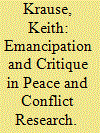

|
|
|
|
|
| Summary/Abstract |
This contribution examines how the critical potential of research on peace in International Relations has been simultaneously marginalized and transformed. It briefly traces the evolution of peace research, as well as choices, contestation, and breaks in the construction (and “disciplining”) of peace and conflict research. It then focuses on two epistemological and normative choices that occlude the emancipatory potential of peace research and marginalize certain approaches to the study of the causes of war and conditions of peace. In a more positive vein, it illustrates, with examples from recent research, where potentially emancipatory or transformative scholarship on building peace has migrated.
|
|
|
|
|
|
|
|
|
|
|
|
|
|
|
|
| 7 |
ID:
161135
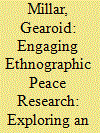

|
|
|
|
|
| Summary/Abstract |
As has been thoroughly rehearsed in the literature, the failures of the liberal peace model of post-conflict intervention have given rise to a ‘local turn’ in peace research. This in turn has refocused attention away from the motivations and practices of international actors towards local ownership and ‘buy-in’, and the importance of culture, context, and ‘the Everyday’. There is a mismatch, however, between the methodological skills among peace researchers today, and the new imperative to explore local and everyday understandings, perceptions, and experiences of conflict, transition, and peace. For this reason a number of scholars have recently emphasized the importance of incorporating ethnographic methods and an anthropological imagination into peace research. However, at this point, and as evidenced in the contributions to this special issue, there are many challenges to such incorporation which must be acknowledge and addressed if the ethnographic approach is to fulfil its early promise to add empirical substance to the local turn. The contributing authors each address different challenges to conducting Ethnographic Peace Research (EPR) in post-conflict contexts and, as this introduction argues, they evidence clearly the variety of questions yet to be answered while suggesting different ways ethnographic approaches can be incorporated into peace research.
|
|
|
|
|
|
|
|
|
|
|
|
|
|
|
|
| 8 |
ID:
059843
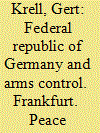

|
|
|
|
|
| Publication |
Frankfurt, PEace Research Institute, 1990.
|
| Description |
49p.
|
| Series |
PRIF report; 10
|
| Standard Number |
3926197668
|
|
|
|
|
|
|
|
|
|
|
|
Copies: C:1/I:0,R:0,Q:0
Circulation
| Accession# | Call# | Current Location | Status | Policy | Location |
| 041432 | 327.170943/KRE 041432 | Main | On Shelf | General | |
|
|
|
|
| 9 |
ID:
152293
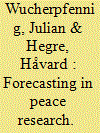

|
|
|
|
|
| Summary/Abstract |
Prediction and forecasting have now fully reached peace and conflict research. We define forecasting as predictions about unrealized outcomes given model estimates from realized data, and predictions more generally as the assignment of probability distributions to realized or unrealized outcomes. Increasingly, scholars present within- and out-of-sample prediction results in their publications and sometimes even forecasts for unrealized, future outcomes. The articles in this special issue demonstrate the ability of current approaches to forecast events of interest and contributes to the formulation of best practices for forecasting within peace research. We highlight the role of forecasting for theory evaluation and as a bridge between academics and policymakers, summarize the contributions in the special issue, and provide some thoughts on how research on forecasting in peace research should proceed. We suggest some best practices, noting the importance of theory development, interpretability of models, replicability of results, and data collection.
|
|
|
|
|
|
|
|
|
|
|
|
|
|
|
|
| 10 |
ID:
067342
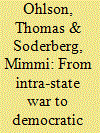

|
|
|
|
|
| Publication |
Sweden, Department of Peace and Conflict Research, Uppsala University, 2002.
|
| Description |
35p.
|
| Series |
Uppsala peace research papers; no. 5
|
| Standard Number |
9150616080
|
|
|
|
|
|
|
|
|
|
|
|
Copies: C:1/I:0,R:0,Q:0
Circulation
| Accession# | Call# | Current Location | Status | Policy | Location |
| 045824 | 327.172/OHL 045824 | Main | On Shelf | General | |
|
|
|
|
| 11 |
ID:
005077
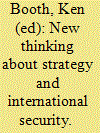

|
|
|
|
|
| Publication |
London, Harper Collins Academic, 1991.
|
| Description |
xx, 390p.
|
| Standard Number |
0044454155
|
|
|
|
|
|
|
|
|
|
|
|
Copies: C:1/I:0,R:0,Q:0
Circulation
| Accession# | Call# | Current Location | Status | Policy | Location |
| 036162 | 355.03/BOO 036162 | Main | On Shelf | General | |
|
|
|
|
| 12 |
ID:
059840
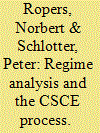

|
|
|
|
|
| Publication |
Frankfurt, PEace Research Institute, 1990.
|
| Description |
37p.
|
|
|
|
|
|
|
|
|
|
|
|
Copies: C:1/I:0,R:0,Q:0
Circulation
| Accession# | Call# | Current Location | Status | Policy | Location |
| 041437 | 327.17094/ROP 041437 | Main | On Shelf | General | |
|
|
|
|
| 13 |
ID:
028879
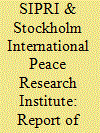

|
|
|
|
|
| Publication |
Stockholm, SIPRI, 1971.
|
| Description |
23p.
|
|
|
|
|
|
|
|
|
|
|
|
Copies: C:4/I:0,R:0,Q:0
Circulation
| Accession# | Call# | Current Location | Status | Policy | Location |
| 007104 | 327.17206/SIP 007104 | Main | On Shelf | General | |
| 007105 | 327.17206/SIP 007105 | Main | On Shelf | General | |
| 007106 | 327.17206/SIP 007106 | Main | On Shelf | General | |
| 009074 | 327.17206/SIP 009074 | Main | On Shelf | General | |
|
|
|
|
| 14 |
ID:
029090
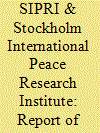

|
|
|
|
|
| Publication |
Stockholm, SIPRI, 1972.
|
| Description |
28p.
|
|
|
|
|
|
|
|
|
|
|
|
Copies: C:5/I:0,R:0,Q:0
Circulation
| Accession# | Call# | Current Location | Status | Policy | Location |
| 009906 | 327.17206/SIP 009906 | Main | On Shelf | General | |
| 009907 | 327.17206/SIP 009907 | Main | On Shelf | General | |
| 009986 | 327.17206/SIP 009986 | Main | On Shelf | General | |
| 009987 | 327.17206/SIP 009987 | Main | On Shelf | General | |
| 011817 | 327.17206/SIP 011817 | Main | On Shelf | General | |
|
|
|
|
| 15 |
ID:
143449
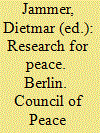

|
|
|
|
|
| Publication |
Berlin, Council of Peace Research, 1990.
|
| Description |
180p.pbk
|
|
|
|
|
|
|
|
|
|
|
|
Copies: C:1/I:0,R:0,Q:0
Circulation
| Accession# | Call# | Current Location | Status | Policy | Location |
| 032005 | 327.172/JAM 032005 | Main | On Shelf | General | |
|
|
|
|
| 16 |
ID:
085873
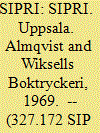

|
|
|
|
|
| Publication |
Uppsala, Almqvist and Wiksells Boktryckeri, 1969.
|
| Description |
11p.
|
|
|
|
|
|
|
|
|
|
|
|
Copies: C:1/I:0,R:0,Q:0
Circulation
| Accession# | Call# | Current Location | Status | Policy | Location |
| 006544 | 327.172/SIP 006544 | Main | On Shelf | General | |
|
|
|
|
| 17 |
ID:
188703
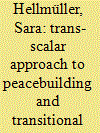

|
|
|
|
|
| Summary/Abstract |
Peace research has taken a local turn. Yet, conceptual ambiguities, risks of romanticization, and critiques of co-option of the “local” point to the need to look for novel ways to think about the interactions of actors ranging from the global to the local level. Gearoid Millar proposes a trans-scalar approach to peace based on a “consistency of purpose” and a “parity of esteem” for actors across scales. This article analyzes the concept of trans-scalarity in the peace process in Ituri, a province in the northeastern Democratic Republic of Congo (DRC). Drawing on qualitative data from more than a year of research in the DRC, I argue that while a trans-scalar approach was taken to end violence, it was not applied to transitional justice initiatives. The result was a negative, rather than a positive peace. By showing the high, but still untapped, potential of trans-scalarity, the article makes three contributions. First, it advances the debate on the local turn by adding empirical insights on trans-scalarity and further developing the concept’s theoretical foundations. Second, it provides novel empirical insights on the transitional justice process in the DRC. Third, it links scholarship on peacebuilding and transitional justice, which have often remained disconnected.
|
|
|
|
|
|
|
|
|
|
|
|
|
|
|
|
| 18 |
ID:
040219
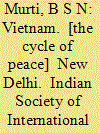

|
|
|
|
|
| Publication |
New Delhi, Indian Societyof International Law, 1968.
|
| Description |
viii,184p.hbk
|
|
|
|
|
|
|
|
|
|
|
|
Copies: C:1/I:0,R:0,Q:0
Circulation
| Accession# | Call# | Current Location | Status | Policy | Location |
| 001924 | 959.7/MUR 001924 | Main | Withdrawn | General | |
|
|
|
|
| 19 |
ID:
004378
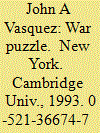

|
|
|
|
|
| Publication |
New York, Cambridge Univ., 1993.
|
| Description |
xiii,378p.
|
| Series |
Cambridge Studies in International Relations,27
|
| Standard Number |
0-521-36674-7
|
|
|
|
|
|
|
|
|
|
|
|
Copies: C:1/I:0,R:0,Q:0
Circulation
| Accession# | Call# | Current Location | Status | Policy | Location |
| 035051 | 355.02/VAS 035051 | Main | Withdrawn | General | |
|
|
|
|
|
|
|
|
|